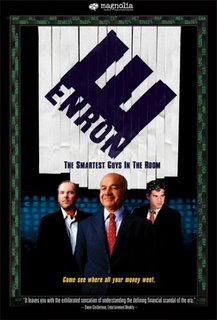
by Ladron de Tebeos
Greeting my fair-weathered, review-reading friends. Just got done overdosing on massive amounts of Olympic coverage and it’s time to pull my mind from those nagging questions that the Olympics always bring me: namely, can those figure skaters spin around real fast like that when they’re….uhhh, crouched on a different surface than ice? Speaking of which, maybe one of you linguistic folks out there can help me out: is Bode Italian for Fat, Drunk Loser? Just curious.
Okay, today I watched the film Enron: The Smartest Guys in the Room. Now, try as I might, I have a hard time walking into this objectively, my thoughts even before viewing were that Ken Lay, Jeff Skilling and the whole gang should be taken out back and be severely beaten and then tossed into a jail cell where they can be severely butt-fucked. This, in my twisted little world view, would be justice. Enron, to me, is symptomatic of what is wrong with our political system as a whole; elected officials slash whores, who don’t really give a flying fuck about you or I, average Joe Taxpayer, but about the companies slash johns and rich folks who feed them their bribes, errr, I mean campaign contributions. So, having gotten my little rant out of the way, let’s see how this plays out.
The film, narrated by Peter Coyote, does a very good job of guiding us through this whole shit storm, using graphics, interviews, footage of shareholder meetings and taped telephone conversations of Enron traders, who sound like a gang of Soprano-ish type thugs as they conspire to plunder the California economy.
Director Alex Gibney takes shots at all the scum bags, (see, I told you I was angry) who knowingly or unknowingly held up this fraud, including the Bush administration and the Wall Street establishment, pointing in particular at Merrill Lynch, which, on Lay's complaint, fired the only stock analyst who dared question the Enron bubble as it was expanding.
There seems to be a general impression that Enron was a good corporation that went bad. The movie argues that it was a straight up B.S. con game almost from the start. It was "the best energy company in the world," according to its top executives Kenneth Lay and Jeffrey Skilling. Of course, at the time they said this, they knew that the company was bankrupt, had been worth big piles of zip for years, had inflated its profits and concealed its losses through bookkeeping practices so corrupt that the Arthur Anderson accounting firm, who in the interest of full disclosure used to employ Mil Peliculas, was destroyed in the aftermath.
One Enron tactic was to create phony offshore corporate shells and move their losses to those companies, which were off the books. We're shown a diagram tracing the movement of debt to such Enron entities. Two of the companies are named "M. Smart" and "M. Yass." Showing how smart they really are: One stood for "Maxwell Smart" and the other one ... well, take out the period and put a space between "y" and "a."
The level of arrogance these peckerheads, Ken Lay, Jeff Skilling, Andy Fastow, and Lou Pai enjoy due to their wheelings and dealings, due to their abject refusal to take responsibility for their own actions, and the powerless consumers taking it up the back door, makes it all seem like some kind of sick joke, these ass-wipes are almost caricatures of the evil businessman.
Enron is a movie you can’t help but become emotionally involved in; by the end you feel as drained as the thousands and thousands of employees 401(k)s.
Based on a best-selling book by Fortune magazine writers Bethany McLean and Peter Elkind, this is a movie that needs to be seen. The Enron scandal was swept under the rug, (google Ken Lay Trial and ask yourself how much of the now recent events you’ve seen on the nightly news) in the fever to push Iraq as America's agenda. It's frightening to find out how much you didn't know.
And did I mention that it really pisses me off?